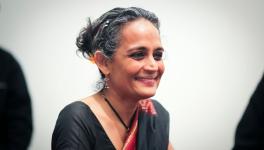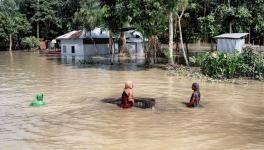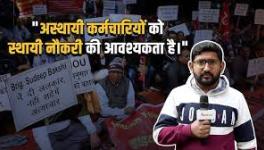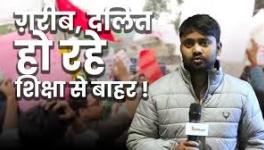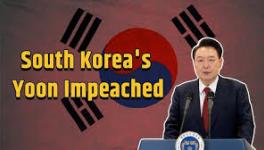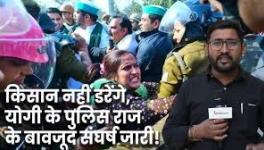EXCLUSIVE: The “Nationalist” Philosophy of Filmmaker Anand Patwardhan
Around two months ago, Indian documentary filmmaker Anand Patwardhan received news of being selected for the Outstanding Achievement Award at the Hot Docs Festival in Toronto, Canada. Speaking to SabrangIndia, Patwardhan said he was happy for the nomination and the exposure it granted to movies of his genre that focus on the “hard realities we all live in.”
The 72-year-old filmmaker is renowned for focusing on socio-political and human-rights based topics like religious fundamentalism, sexual violence against women, demolition of Babri Masjid, the Indian and Pakistani nuclear weapons test among many others.
Patwardhan says that he does not pick and choose these themes but simply does what he has to do to “make the situation better” if he can. Be it Ram ke Naam or Father, Son and the Holy War, or War and Peace or Jai Bhim Comrade, the filmmaker says it is the subject matter that drives the film.
While he believes the opportunity at the Hot Docs Festival, the largest international documentary festival in North America, will elevate his profile, he doubts the situation will improve in home turf.
“My films are difficult to show in India. Even the ones that have censorship certificates,” he says.
Patwardhan blamed the ruling regime for this which allowed movies like The Kashmir Files but censored secular movies that attempted to talk about communal violence. He says the struggle to get permission for screening his movies is the biggest challenge. On this and similar such issues, Patwardhan shares his views in this interview.
Many of your films focus on religious fundamentalism and other issues like violence against women for example. In current times, how do you see the hijab controversy?
The Hijab controversy is a bit of a minor story in a larger picture which is the rise of fascism, majoritarian values. In terms of hijab, nobody has a right to tell people what to wear and what not to wear. Muslim women have a right not to wear a hijab if they don’t want to, and if they want to, they have a right to wear it. It should be their choice, not something other people should dictate.
Do you feel a religion-based nationalist sentiment is growing in India?
It depends on how you use the word “nationalist”. The people who are pushing Hindutva, I wouldn’t call them nationalists at all. They are actually anti-nationals. This country is meant to be a secular democracy. They are not even religious. They are only using religion. I doubt if they even pray. They are using religion for political gain.
They are called Hindu nationalists but it is a bit of a problematic thing to call them nationalists at all. They never fought for India's freedom. They collaborated with the British. They openly advocated supporting the British. And no one from their whole pantheon of icons went to jail. The only one who went to jail was Savarkar and he wrote five mercy petitions begging the British to free him. In return he swore loyalty to them forever. The only thing he did was organise a plot to kill Mahatma Gandhi and spread hatred against Muslims. This is what is continuing today.
Your film ‘Reason’ was officially unreleased in India. Do you feel if it hadn’t gotten the resistance it did, the movie would have had some impact on 2022’s Assembly elections?
(Humorously) That is giving too much power to filmmakers. But yes, if such movies had been from the beginning shown to the public in a big way, then the whole country would have been different. I’m not only talking about ‘Reason’ in the last few years. For instance, ‘Ram ke Naam’ was made in 1990 when the BJP was not in power. Congress and many other governments came and went but none of them wanted to show ‘Ram ke Naam’ on Doordarshan and on TV and make sure that the public understands what this communal game is. So many parties have contributed to people’s lack of understanding on this communal issue.
Still, your movie would have really educated the masses.
Yes but the movie would do that only if it had been properly screened to a large number of people. Which means it would have to be on Doordarshan and government-controlled Doordarshan could have easily shown these movies on a regular basis. Instead they showed Ramayana on a regular basis. They actually had to cultivate the whole ethos that finally resulted in Babri Masjid being demolished.
You mentioned The Kashmir Files. Some people like the Rashtriya Swayamsevak Sangh (RSS) loosely alluded to it as a documentary of sorts. What is your opinion on this?
It is not a documentary at all. It is not only fiction but worse it is based on fake news. It is true that what happened to Kashmiri Pandits should not have happened. It was a terrible thing. But they have exaggerated the numbers of how many Kashmiri Pandits were killed. Secondly, they have hidden the fact that BJP was very much in power and the Governor of Kashmir at the time was close to the RSS who encouraged the Kashmiri Pandits to leave Kashmir. After they left, for so many years, BJP has been in power but they have not done anything to help them. They have kept them as show-pieces in camps. They are just utilising these issues for their own games.
Your film ‘Jai Bhim Comrade’ got excellent reviews at the time. Do you plan to make more such films?
My films are not planned that much. Of course, I will probably make some films but I haven’t decided what I’m going to do. It depends on what is happening in the real world, and whether I can access it or not.
Your films also inspire a lot of other artists to write about such issues. But nowadays censorship is rampant even on social media. Is there anything you would like to say to these artists and filmmakers?
In social media also there is censorship to an extent, but the real censorship happens in print media. It happens because the commercial world, the people who have the money and all the papers and TV channels are either scared of what the government will do to them and or they want to curry favour with them. So it’s very difficult to get a story into the newspapers or on TV which is telling the truth.
Even on social media there is some kind of censorship. All these spaces like Twitter and Facebook are controlled by the corporate media which is again playing a game with the Government of India. You have to find ways around it. Whatever happens, you have to speak out.
***********
According to Patwardhan, if people are allowed to watch and understand movies like ‘Reason’, they would also realise that the so-called terror attack on Mumbai was only partly organised by Pakistan.
“There were Hindutva elements who actually used that attack to kill Chief of Anti-Terrorist Squad Hemant Karkare, who was murdered that day. He was trying to investigate the Hindutva terror and they wanted him out of the way,” says Patwardhan, of the firm belief that if people understand these nuances, the situation will improve and the right people will go to jail.
The Doc Festival will be held in Toronto, Ontario, Canada from April 28, 2022 to May 8, 2022 where 226 films from 63 countries will be shown, reported The Wire.
Get the latest reports & analysis with people's perspective on Protests, movements & deep analytical videos, discussions of the current affairs in your Telegram app. Subscribe to NewsClick's Telegram channel & get Real-Time updates on stories, as they get published on our website.















